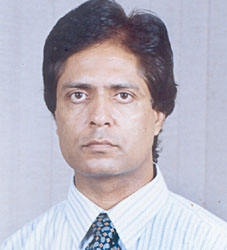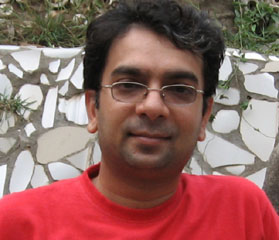Anna Hazare Goes Out; Corruption Stays with Us
I had heard that some movies are based on real-life stories. But the converse is also true. I have realized this after seeing the Anna Hazare show during the past few days in India.
By Rakesh Raman
Peepli Live movie was released last year by Bollywood actor Aamir Khan’s film production outfit. The film was a subtle satire on many burning issues in India – including farmers’ suicides, corruption, media blowups on even trivial matters, selfish political interests, et al.
The central character Natha in the movie saves his life by running away from the crowd that wanted him to sacrifice his life to solve a certain persisting problem.
Perhaps, Hazare has seen or heard about this movie. After beginning his fast unto death Tuesday to highlight the corruption issue in India, he was looking for the earliest opportunity to somehow come out of his suicidal attempt.
Hazare’s hunger strike was to demand amendments in the Jan Lokpal Bill (Citizen’s Ombudsman Bill) that aims to end corruption in the country. But deep inside, he knew that even in its best form, the Bill is not going to be any panacea for the cancer-like corruption pandemic in India.
[ Also Read: Can Anna Hazare Give Us Corruption-Free India? ]Naturally, Hazare was waiting for a safe passage to run away from the crowd that was hell-bent to push him on the dirty political altar. Finally, today (April 9), the Indian government helped him escape by issuing statements that have no meaning at all.
But the Hazare associates and government bosses made it appear like all his demands have been accepted by the government. In fact, it was nothing but an ambiguous agreement for mutual convenience – government got freedom from the embarrassment and Hazare his life.
After four days of fast, Hazare decided to relish his food again, leaving millions who supported him in a state of utter confusion. There is a big question mark on the outcome of this week-long hullabaloo. What has he or others around him achieved? Zilch. It began like a bubble and blew off like a bubble.
[ Also Read: After Mosque, Demand for Ground Zero Church ]Hazare and his close comrades have successfully convinced the herd-like Indian public saying he has made big strides in the war against corruption. Since most Indians lack ability to think and analyze, they have started shouting slogans in favor of Hazare and his clique.
Poor Indian masses. They believe what irresponsible and selfish media honchos want them to believe through their sensational reports. Indian public – illiterates as well as educated illiterates – can be dragged in any direction by false propaganda and media blitzkrieg as Peepli Live portrayed.
[ Also Read: Peepli Dead: True Story of Cyber Zombies in India ]But the fact of the matter is that Hazare has failed miserably in his attempt to rid the country of this dreadful disease called corruption, though he began it on the right note.
So, what does he want to say after his brief drama in Delhi? What made him break his fast? What has government promised to him? Is it the end of corruption in India?
Hazare won’t have any answer to these questions. It’s not a simple issue that Hazare’s fast can solve. Corruption has many ugly facets, which Hazare and his companions wouldn’t have even thought about.
Some are here. A bureaucrat, for example, who has paid bribe at every step of their carrier to attain the position, would certainly want to recover that money – by fair means or fouls. Others may call it corruption. But for that bureaucrat, it’s return on investment. It’s basically to view the same thing from two different angles. Can Hazare or his Bill change such mindsets?
There are thousands of such government officers in India for whom ill-gotten money from contractors, public, etc. is part of their regular earnings. They don’t see anything wrong in this practice.
[ Also Read: Nobel Peace Prize for Chinese Human Rights Activist ]Let alone ordinary officers, even the Central Vigilance Commissioner (CVC), which is the highest position to stop corruption in the country, can’t resist the temptation of making easy bucks. The recent CVC P.J. Thomas was removed from his position after a court case last month on charges of financial irregularities, though the ruling UPA government led by Prime Minister Manmohan Singh tried to protect him, ignoring his tainted past.
So what? If Hazare thinks getting a corrupt official removed from the job is the right punishment for corruption, he is wrong. Who needs a job after making millions and billions through corruption? Hazare and his Bill need to inform the public at large what more they will do with such cases.
Now, take the case of politics. In India, it is a profession for the hardcore goons. Most here join politics to commit crimes without any restraint and governments support such criminal elements because they can intimidate voters in their favor.
At least one-fourth of the 540 Indian Parliament members are involved in all sorts of criminal activities, including human trafficking, immigration rackets, embezzlement, rapes, and even murders. After committing crimes, these politicians become bigger heroes.
Example: In 1996, a union communications minister Sukh Ram of the ruling Congress party in Prime Minister P.V. Narasimha Rao’s cabinet was involved in large-scale corruption. The Central Bureau of Investigation (CBI) seized Rs. 3.6 crore (at that time one USD was equal to about Rs. 30) in cash concealed in bags and suitcases from his residence.
After a few days of noise against him in Delhi, he was allowed by the government to go back to his home state Himachal Pradesh. He started living there the life of a king with huge money in his pocket.
He is not alone who enjoyed such government-backed privilege and immunity. All of those who made billions in the recent Commonwealth Games scam, telecom scam, fodder scam, IPL cricket scam, or even the Bofors scandal are leading comfortable lives because there is hardly any punishment for corruption in India.
Politicians – in the government as well as in the opposition – are chips of the same block. They are honest so long as they don’t get the opportunity to make money illegally. In the process, Indian corrupt have stashed away more than US$1.4 trillion in Swiss banks in the form of black money, which is estimated to be more black money than the rest of the world put together.
Can Hazare or his proposed Bill get that money back for the Indian commoners? Can he, at least, find out the names of those who own this black money and make those names public?
In the 1990s, the then CVC, N. Vittal, had put the names of all corrupt IAS, IPS, and other officers on a Website for the public to know about their misdeeds openly. Can Hazare also do the same? If he can’t, he has wasted his own time and that of others who supported him in his drive against corruption.
He must also know that there are other cases of camouflaged corruption when government begins huge wasteful projects to squander away public money. Take Unique Identification Authority of India (UIDAI) project, for example. It aims to issue some identity cards to Indian citizens. While estimates suggest this project will eat up more than US$ 30 billion (nearly Rs. 150,000 crore) of public funds, its benefits to public are not yet clear.
There are many such projects that have been started in India to siphon off money by the bureaucrats and politicians. What is this if it’s not corruption? How does Hazare with his Bill propose to hold the officials behind such projects accountable?
That’s not all. The tentacles of corruption are widely spread in the country. What will be the mechanism to complain against a corrupt school principal who asks for undue fee from poor parents of a child? How will one complain against a traffic police constable who asks for bribe on the open road? How Hazare proposes to punish those officers who behave arrogantly and don’t care about public grievances? How will Hazare stop government bosses who favor the vendors illegally? Will Hazare also deal with corrupt people who are always eager to bribe? And so on.
If he wants to clean out this whole mess, he will have to make a Lokpal-managed court in every small street of India. And if he wants to send all the culprits to prison, the size of the prison will be bigger than the city of New Delhi because the corrupt people in this country are in millions.
Can he do that? Did Hazare think about all this before sitting on fast? Perhaps, he didn’t. As a result, he has added more confusion to the already complex corruption issue.
Now, if he is counting the number of directionless feet or the amount of candles around him to measure the success of his campaign, he deliberately wants to live in fool’s paradise.
Nobody can – and nobody should – stop him from doing so. I will also not do that. But I know that with such crude steps that Hazare has taken, I will have to die in corrupt India, as I have lived here for years. All of you will also face the same fate. Believe me.
By Rakesh Raman, the managing editor of Raman Media Network.
💛 Support Independent Journalism
If you find RMN News useful, please consider supporting us.




